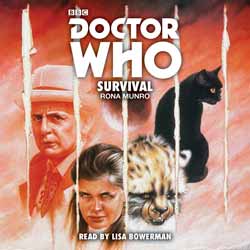|
Click here to return to the main site. Audio Book Review
The Doctor brings Ace home to Perivale. On a summer Sunday it seems the least lively place in the universe, yet mystery lurks behind the calm facade. The members of Ace’s old gang have gone away, each of them disappeared without trace. Something is killing the domestic pets of Perivale, and unearthly hoofprints scar the baked earth of the recreation ground. What strange force connects all these events? As Ace herself is transported to a distant planet, it seems that the Doctor may be stepping into a well-prepared trap. Can it be the work of his old adversary, the Master – and if so, to what end…? Nowadays, Lisa Bowerman is best known (to sci-fi fans at least) as the voice of Professor Bernice Summerfield, a former companion of the Doctor, who was created for the Virgin Books range of original novels but who has since enjoyed a far longer tenure in a series of audio adventures from Big Finish Productions. However, Bowerman’s earliest role in Doctor Who was not as Bernice but as Karra, one of the fur-covered Cheetah People in the three-part 1989 serial Survival. She now reads the unabridged audio book of Rona Munro’s novelisation of the story, which was originally published by Target Books in 1990. In adapting her own television scripts, Munro (the only writer to have provided scripts for both the old and new series) adds a number of details that were not present on screen, including a new scene for the shopkeepers Harvey and Len. In what is probably an in-joke, the author likens them to night-club bouncers when Midge comes into the shop and starts making trouble (on screen, Harvey and Len were played by the comedians Gareth Hale and Norman Pace, famous for their sketches as ‘The Management’). Midge also has an additional final confrontation with Derek, a fellow escapee from the Cheetah Planet. Some of Munro’s changes restore ideas that did not make it into the television production, such as Ace hiding underwater from the pursuing Karra. The ruins of an ancient civilisation on the alien world are considerably more impressive than the couple of brick walls we saw on screen: the Doctor notices a cathedral-like dome and shaped blocks of stone the size of small cottages. Sergeant Patterson is a policeman rather than a member of the Territorial Army (producer John Nathan-Turner had wanted to avoid depicting the police in a negative light). The age of the Cheetah People’s first victim has been changed: he is now older, and the woman who notices his disappearance is his wife, not his mother. The action is also bloodier, with more explicit detail of the Kitling’s killing of domestic cats, and Midge coming to a more violent end. The whole tone of the book, in fact, is decidedly grim. The author also gets into the heads of the characters, in particular the Doctor and Ace. Through the Doctor, Munro ponders at length about why the Master embarked upon his course of universal domination and developed such an obsessive hatred for the Doctor. This was the first time that the Master’s motivations had been explored in such detail – though somewhat different backstories would later emerge in the original novel The Dark Path, the audio drama Master and the David Tennant / John Simm episodes of the revived television series. In contrast to all this extra material, the Doctor’s closing monologue (“Come on, Ace – we’ve got work to do!”) is not present in the novelisation. This was a late addition to the final instalment of the serial by script editor Andrew Cartmel, dubbed on to the videotape recording as an afterthought, when it was realised that this would be the last episode of Doctor Who for some time. However, despite the fact that the author was disappointed by the realisation of the Cheetah People (she thought they should just have had cheetah eyes, big canine teeth, and a faint pigmentation of cheetah spots on the skin), the beings depicted in the book resemble the fur-covered costumes that the unfortunate actors, including Lisa Bowerman, had to wear during the hot summer location shoot. Bowerman matches the sober tone of Munro’s prose – as does Simon Power’s portentous organ music, which is decidedly different to the television show’s howling electric guitar score by Dominic Glynn. As is usual with readers attempting to emulate the vocal style of Sylvester McCoy, Bowerman sounds a bit too broadly Scottish as the Seventh Doctor (sounding more like Peter Capaldi at times). Those Scottish tones come in handy for Sergeant Paterson, though. He sounds very similar to the screen version of the character – as does the voice of Ace’s fundraising friend Ange. Meanwhile, Ace herself often sounds uncannily like Sophie Aldred. And of course, Bowerman is spot on as Karra! Ironically, given its title, Survival would prove to be the final story of Doctor Who’s original run, and the book was the penultimate novelisation in the Target Books range. However, in 1991 Virgin Books began publishing original novels… and this is where we came in. Doctor Who survives. Now, thanks to BBC Audio and Lisa Bowerman, this novelisation lives on as well. 8 Richard McGinlay Buy this item online
|
|---|

